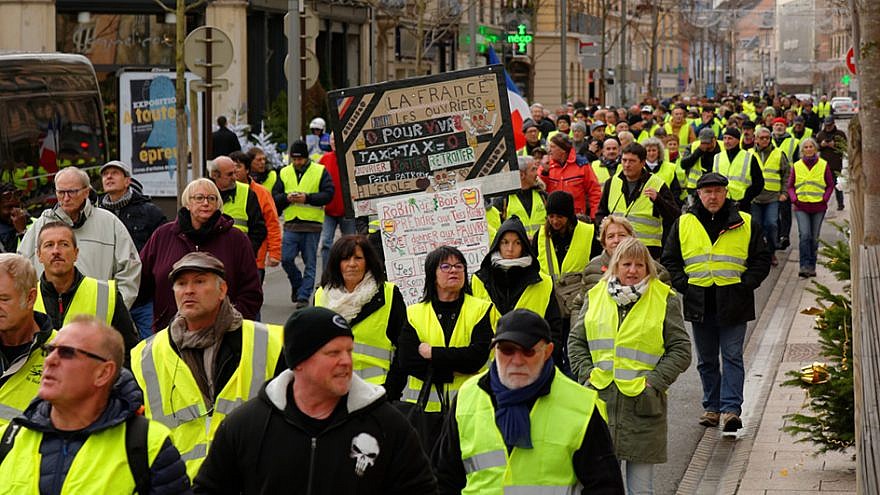The good news is that on Tuesday, huge crowds of French citizens attended rallies against anti-Semitism throughout France that were supported by all of the country’s major political parties. And French President Emmanuel Macron denounced the desecration of a Jewish cemetery, the latest example of a shocking growth in acts of anti-Semitism.
Across the English Channel, the British government has been similarly outspoken in denouncing anti-Semitism. The protest of eight membersof the House of Commons who left the Labour Party over its failure to address anti-Semitism ingrained in its leadership, as well as the rank and file, was similarly applauded for their courage and willingness to risk the lose of their seats in the next election rather than to remain silent.
And while panic is not the appropriate reaction to these events, neither is complacence or even confidence that it will all soon blow over. Anti-Semitism is deeply rooted in the culture of European society. But what is happening now throughout the continent, but most particularly in Britain and France, is that as has happened so many times in the past, Jew-hatred has attached itself to popular political movements and political parties.
With anti-Semitic incitement becoming part of the rhetoric of the “yellow-vests” protest movement against Macron’s government in France, as well as one of the defining characteristics of Britain’s Labour Party, it’s no longer possible to pretend that anti-Semitism isn’t working its way back into the mainstream of Western European political culture.
It’s also instructive to note that as much as the Nazi march in Charlottesville, Va., and the murder of 11 Jewish worshippers in a Pittsburgh synagogue prompted a panic about anti-Semitism in the United States, the situation here is nothing like that in Western Europe. The kind of fear of being recognizably Jewish while walking on a Paris street that haunts French Jews is unknown in the United States. Similarly, Jewish politicians in the United States simply don’t face the kind of malicious abuse for their faith and/or support for Israel that is routine in Britain.
American Jews have good reason to worry about the prominence and acceptance of members of Congress like Rep. Ilhan Omar (D-Minn.) and Rep. Rashida Tlaib (D-Mich.), who have tweeted anti-Semitic tropes and are stalwart backers of the anti-Semitic BDS movement. But there is no comparing the Democrats to the British Labour Party, where someone far more brazen than either of them is flaunting hate for Israel and Jews, and tolerance for anti-Semitism and even Palestinian terrorists. Labour head Jeremy Corbyn is the leader of the opposition in parliament, rather than merely a backbencher.
Corbyn stands a fair chance of being the next prime minister of Britain. None of the Democratic candidates for president, including Sen. Bernie Sanders, who has been the most critical of Israel of the two-dozen prospective contenders, can be remotely compared to Corbyn in terms of tolerance for and encouragement of anti-Semitism.
To note that doesn’t mean that Democrats don’t need to worry about the growth of the intersectional left in the ranks—something that has produced constituencies for Omar and Tlaib. That has also caused a genuine division among Democrats about the Jewish nation at a time when Republicans have become lockstep supporters of Israel.
Similarly, those who claim that U.S. President Donald Trump is an anti-Semite are simply confusing their abhorrence for him over his politics and management style with Jew-hatred. Trump is flawed and has at times said things that can be construed as encouragement for extremists. But he is no anti-Semite, as well as arguably the best friend Israel has ever had in the White House.
Comparisons and attempts to manipulate statistics to make America seem analogous to Britain and France are simply wrong. As the willingness of Democrats to rebuke Omar and the country’s response to Pittsburgh showed, America is still passing the anti-Semitism test with flying colors.
Unfortunately, the same can’t be said for either Britain or France, even if their governments are saying the right things about anti-Semitism.
Neither British Prime Minister Theresa nor Macron can be faulted for their willingness to address anti-Semitism. In May’s case, she has done it while staring directly at Corbyn as she faced him across the aisle in the House of Commons. And Macron’s willingness to speak out immediately—as he did after the most recent incidents, including the mobbing of Alain Finkielkraut, a leading French intellectual and television personality, by a group of “yellow-vests protesters—is similarly laudable.
But it’s also true that both May and Macron are currently deeply unpopular figures at home. May’s fumbling of the Brexit crisis and Macron’s elitist contempt for ordinary Frenchmen as he pursues climate-change goals have put them both under water in terms of popularity. These issues have also diminished their ability to help shift the culture away from anti-Semitism or to do anything about the routine targeting of Jews in either country.
In both countries, leftist ideologues and Muslim immigrants have created a broad movement of hate for Israel that is the thin veil covering a resurgence of anti-Semitism. Far from operating on the margins, the current state of both the “yellow vests” and Labour indicate that hatred of Jews has gone mainstream in a manner unknown since the Holocaust in Western Europe.
British and French Jews should not allow themselves to be intimidated, and it is heartening to realize that there are still plenty of decent people there who are willing to fight for the souls of their nations. But no one can say with any assurance that Jews have a future in places where anti-Semitism has so strong a hold on popular opinion. This is a sobering thought for those who love both Britain and France. It should also remind Americans to value the exceptional nature of their democracy.

























